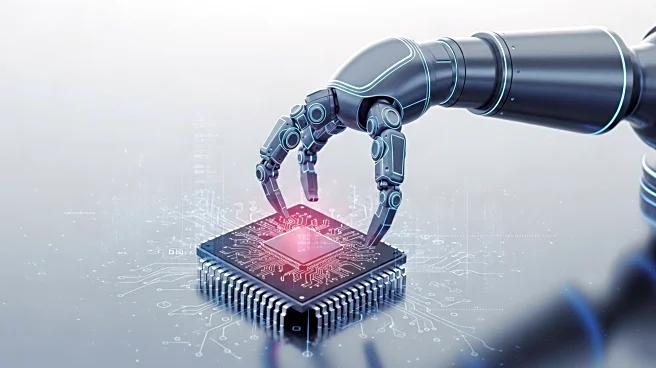What is the story about?
What's Happening?
Qualcomm, a major supplier of mobile phone chips, has acquired Arduino, an Italian not-for-profit firm known for its hardware and software used in developing prototypes of robots and electronic gadgets. This acquisition allows Qualcomm to expand its reach into various fields, including connected vehicles, wireless earphones, laptop computers, and industrial machines. Arduino, with its open-source platform, boasts over 33 million developers worldwide, and is widely used by students and professional engineers for building and programming electronic devices. Qualcomm plans to introduce an Arduino development board powered by its 'Dragonwing' processing chip, designed for devices requiring computational power akin to computers or phones, along with real-time control over robotic elements.
Why It's Important?
The acquisition of Arduino by Qualcomm signifies a strategic move to enhance its presence in the robotics and electronic device sectors. By integrating Arduino's open-source platform, Qualcomm can leverage a vast community of developers to innovate and expand its technological offerings. This development is crucial for the U.S. tech industry as it could lead to advancements in robotics, AI, and other computational technologies, potentially boosting innovation and competitiveness. The introduction of the 'Dragonwing' processing chip further underscores Qualcomm's commitment to providing powerful computational solutions, which could benefit industries reliant on advanced robotics and AI systems.
What's Next?
Qualcomm's acquisition of Arduino is expected to foster collaboration between the two entities, with plans to support chips from other makers, ensuring compatibility and flexibility for developers. The introduction of the new Arduino development board and the 'AppLab' coding tool aims to bridge the gap between coding languages used in robotics and complex AI systems. This could lead to increased innovation and development in the robotics sector, with potential applications in various industries, including healthcare, manufacturing, and consumer electronics. Stakeholders in these sectors may anticipate new opportunities for integrating advanced robotics and AI technologies into their operations.
Beyond the Headlines
The acquisition highlights the growing importance of open-source platforms in driving technological innovation. Arduino's retention of its independent brand and mission suggests a continued focus on accessibility and education in electronics and programming. This move could have long-term implications for educational institutions and tech startups, providing them with enhanced tools and resources to develop cutting-edge technologies. Additionally, the collaboration between Qualcomm and Arduino may set a precedent for future partnerships between large tech companies and open-source communities, fostering a culture of innovation and shared knowledge.















